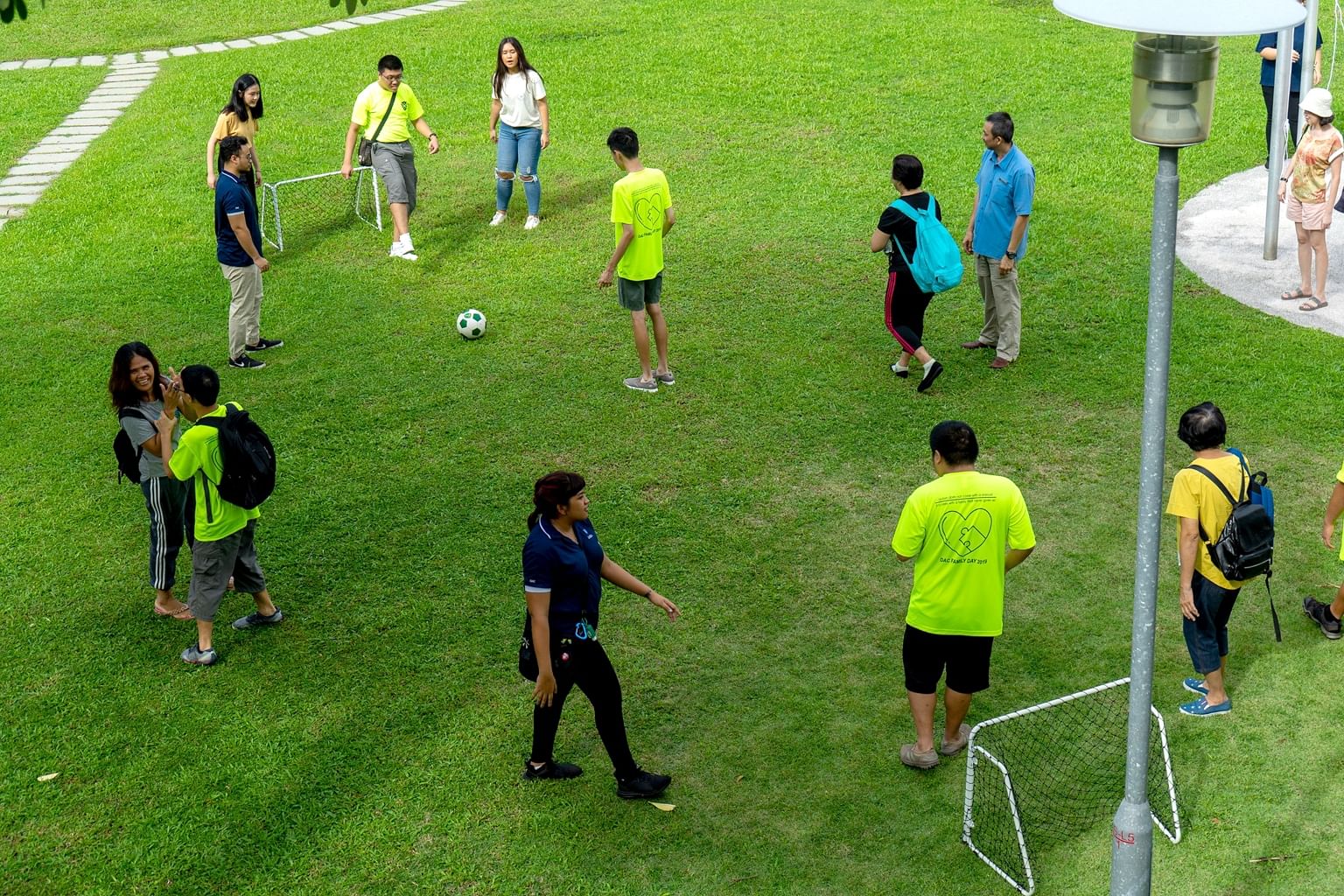Funding, staff limits cause up to five-year wait at centres for adults with autism
Sign up now: Get ST's newsletters delivered to your inbox

Clients and their families taking part in a Family Day organised by SAAC's Siglap branch in 2019.
PHOTO: SAAC/FACEBOOK
Deon Loke, Malavika Menon
Follow topic:
SINGAPORE - Eight months before their son, Raouf, who has severe autism, graduated from special education school Rainbow Centre last November, civil servant Majeed Khader and his wife began the process to enrol him in a day activity centre (DAC).
One year on, Raouf, 19, like many of the graduates in his cohort, is still waiting for a spot.
Current wait lists for the six DACs serving adults whose primary diagnosis is autism spectrum disorder range from one month to five years, with many of the centres citing limited funding and a shortage of trained manpower as causes for the backlog.
All six centres are run by social service agencies.
DACs offer clients a safe environment to interact with peers and retain important communication and social skills, offering an alternative care arrangement for families with children who have graduated from special education schools.
Autism spectrum disorder refers to a developmental disorder that affects a person's ability to communicate and interact. The disorder also includes limited and repetitive patterns of behaviour.
One in 150 children here has autism, a higher rate than the World Health Organisation's global figure of one in 160.
These figures were revealed in the Government's third Enabling Masterplan released in 2016.
Mr Bernard Chew, chief executive of St. Andrew's Autism Centre, which serves about 120 clients across two branches in Sengkang and Siglap, said social service agencies face difficulties trying to expand their services and take in more clients.
"When we enrol each new client, we have to review how we will be able to raise the funds to meet their needs. Unlike special education schools, a place in a DAC may be a lifelong enrolment and we aspire to give our clients a dignified life, offering them the same opportunities as those without autism," he added.
With more students with autism graduating each year from special education schools like Rainbow Centre, Eden School and Awwa School, Mr Chew said the demand for DAC services will continue growing.
According to the day activity service matrix on SG Enable's website, the waiting time for a place at Eden Centre for Adults' Clementi branch is five years while the wait at the Hougang branch is two years.
Both centres have about 40 clients each at present.
Besides capacity and staff constraints, THK Autism Centre @ Geylang Bahru, which currently has a waiting time of between six months and a year, also cites buffer periods between the introduction of new clients so that instructors and peers can get adapted to the changing environment as another reason for the long wait times for enrolment.
The centre can serve up to 67 clients at a time.
Responding to queries from The Straits Times, the Ministry of Social and Family Development (MSF) said the utilisation rate of the six autism spectrum disorder-specific DACs is about 81 per cent.
The six DACs that serve people with autism have a total capacity of more than 300 places.
Three of the six centres are full at present, the ministry added.
MSF said it increased funding for DACs by 20 per cent in October last year to enable them to hire more care staff and increase the quality of services.
Along with eligible subsidies from the ministry for each client enrolled, DACs may also tap other sources, such as via fund raising or donations.
The six DACs charge standard fees of between $980 and $2,400 a month, according to the SG Enable matrix. I
n October last year, a cap was introduced on the fees for DAC clients from households with gross per capita household income of $2,800 per month or less.
"We are also studying the longer-term demand for DACs, and will look into setting up new DACs in areas where demand is expected to exceed the current supply," MSF added.
MP Denise Phua, president of Autism Resource Centre and chairman of Autism Association Singapore, noted the limited daycare options that are available for adults with autism who have moderate to high support needs, as well as the high operational costs of running DACs.
To solve the issue, she said, there is a need to find a sustainable cost-sharing funding formula to continue DAC services and also develop a wider range of services to meet the demands of adults with autism who have higher needs and cannot do paid work.
"This will call for a deeper analysis of client needs, operational costs and funding sources. It is a key historical gap that is not easy to solve and the next Enabling Masterplan can help facilitate a think-tank and partners to address the gap," said Ms Phua who is also MP for Jalan Besar GRC.
For Mr Majeed, 56, his wife, 51, and their 22-year-old daughter, the wait is a stressful and uncertain one.
The family takes turns caring for Raouf, who needs help with tasks like putting on his clothes and using the toilet. To help him understand the change from school to home and, in time, a DAC, the couple use a series of cards to illustrate the transition, although they are not sure how much Raouf can comprehend the shift.
Mr Majeed said: "After many years of wearing his uniform, taking the bus to school and meeting his friends, this period has been disruptive and difficult for Raouf.
"My hope for my son is that he is able to find a routine in a new environment where he feels welcome, where he learns new skills and he is able to interact with the community with joy and dignity."

